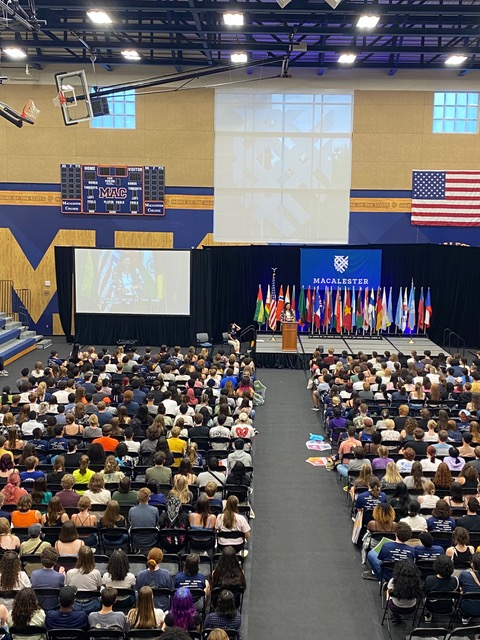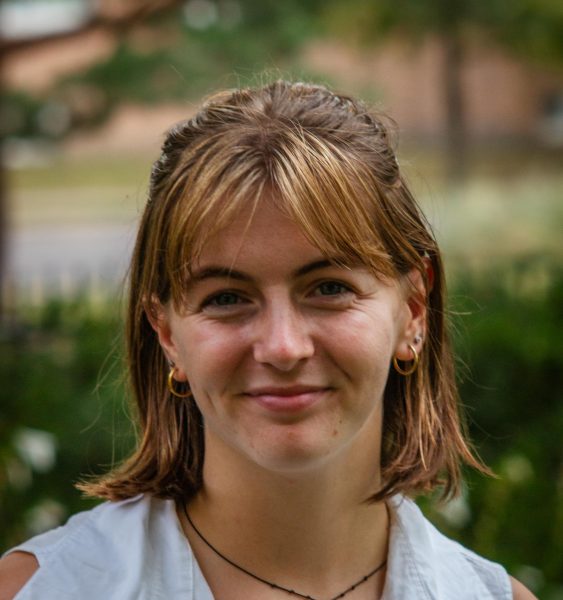Macalester starts its first (mostly) back to normal year
September 29, 2022
The start of the 2022-2023 academic year marks nearly two and a half years into the COVID-19 pandemic, and all four classes attending Macalester College have felt the effects on their college life, each in different ways. Though variance between individuals is undoubtedly present, the overall social and academic impacts of the pandemic remain.
Those in the junior class of 2024, the so-called “pod year,” were instructed to limit their social circles, called pods, to 3-4 people by the college, putting constraints on the number of people they could meet and befriend. Without roommates or upperclassmen present on campus, they spent their first-year masked, socially distanced and with their classes completely online.
“In 2020 it was hard, it was all Zoom,” Andrew Yacoub ’24 said. “You didn’t have the sense of going to class and interacting with your classmates before and after class and talking to your professors before and after class. I feel like I was robbed of one of my four years.”
The class of 2023, the current seniors, feel the same effects of the 2020-21 school year, which they spent completely online. Their first year was cut short and students were forced to sacrifice new friendships and their in-person learning experience.
“After having lost that year [and the next], now being sort of a normal year [many] have felt like they need to catch up by doing everything and being part of every group and doing every internship,” Ingrid Salvador ’23 said. “I think there’s a little bit of making up for lost time that people feel.”
The current first-year class on campus, the class of 2026, also feels those pressures, but in a bit of a different way. These students missed out on a different pivotal point in their social development and many are feeling the effects to this day.
“[The pandemic] changed everything. I missed out on two whole years of high school, I wasn’t allowed to do anything I liked doing,” May Kinnamon ’26 said. “[COVID] affected that social aspect where [for] a bunch of my high school experience I was not interacting with people.”
Similar to the high school COVID experience of the first-years, upperclassmen were at home during the pandemic, taking their classes and attempting to keep up their social lives and college connections online.
“I think the Zoom [classes] were very difficult. It was a lot more difficult to build community because [professors were] trying to give [students] important information, but also trying to have [them] engage in a setting where you want them to discuss with each other and make new friends,” Salvador said.
“It’s kind of impossible to do that well in [an online] format because people are already nervous,” she continued.
For those on campus during the pandemic, the social struggles were also present, manifesting mostly in how students were able to interact with each other and even with themselves.
“There were some benefits to [being on campus] as a whole class but individually it was a bit harder to interact with people. You would just sit with your pod, regardless of if those people were your fit or not, but you’re stuck with them because you don’t want to invade other people’s pod,” Yacoub said.
Faculty recognizes these changes in students’ social lives as each class goes through the orientation process and starts to get settled in. Director of Student Leadership and Engagement at Macalester College Laurie Adamson, has organized the orientation process for the past seven years and is in a unique position to evaluate these differences.
“Coming out of COVID, I think a lot of people are re-learning how to have increased social and in-person time,” Adamson wrote in an email to The Mac Weekly.
Ram Guruprasad ’25 sees the social repercussions of the pandemic in their class too, most notably how the lack of social interaction then is still having an impact on students’ social lives now.
“[There’s] a lot more work [socially] coming out of COVID, everyone’s out of practice,” Gurupasad said. “I think a lot of people here are also experiencing [those hardships], so it was relatively easy to have a social life because everyone else is also missing, and we’re all in the same boat together.”
This sentiment carries throughout the campus at Macalester, echoed by faculty, staff and students, and resources have been built to help support the social and emotional transition into college.
“It’s normal for you to feel like you are still finding your footing.” Adamson wrote. “Use the resources at your disposal to navigate this time, [and] as hard as it can be to put yourself out there, lean into the discomfort — reach out and try to get to know someone on your floor, in class, or in Cafe Mac. You can ward off things like homesickness by beginning to create community and connections here so Macalester can start to feel like home too.”
This year is the closest year to normal anyone on campus has experienced, and that feeling of community is more present than ever, bringing much excitement about what the year will bring.
“The pandemic year [threw] everything off and then last year was a reset year where a lot of things were still in flux in terms of different policies … it’s so energizing [now] especially with the weather being so nice [and] people are hanging out outside, there’s so much activity on campus,” Salvador said. “This year [feels] really good.”














